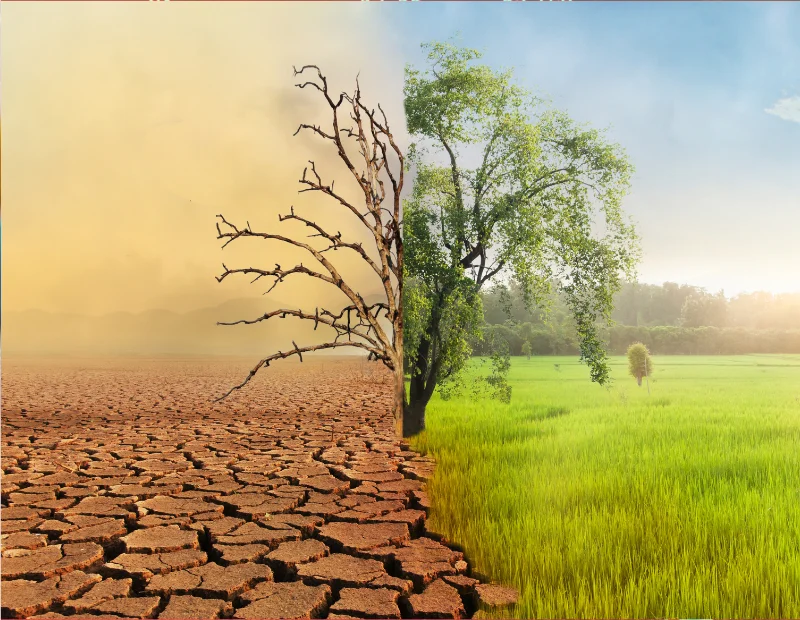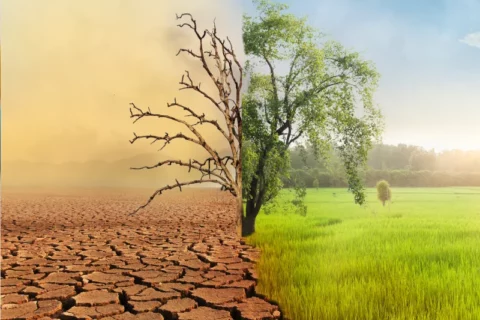
Climate change has emerged as one of the most pressing global challenges of our time, posing significant threats to the environment and all life on Earth. In this blog, we will delve into the topic of climate change and explore its profound impact on the environment, emphasizing the urgent need for collective action and sustainable solutions to mitigate its effects.
- Altered Ecosystems and Biodiversity Loss:
Climate change disrupts ecosystems and profoundly affects biodiversity. Rising temperatures, changing precipitation patterns, and extreme weather events lead to habitat loss, altered migration patterns, and shifts in species’ distributions. Ecosystems, such as coral reefs, forests, and wetlands, face increased stress and vulnerability. These changes can have cascading effects, impacting species interactions, food webs, and overall ecosystem stability. Biodiversity loss, caused by climate change and other factors, threatens the delicate balance of nature, reducing resilience and potentially leading to irreversible ecological consequences.
- Rising Sea Levels and Coastal Vulnerability:
One of the most visible and tangible impacts of climate change is the rising sea levels. As global temperatures increase, glaciers and ice caps melt, contributing to the expansion of ocean waters. Rising sea levels pose a significant threat to coastal areas and low-lying islands, leading to increased coastal erosion, inundation of coastal habitats, and the displacement of coastal communities. The saltwater intrusion into freshwater sources also poses challenges for agriculture, drinking water supplies, and ecosystems that rely on these freshwater habitats. The vulnerability of coastal regions to storms and flooding is exacerbated, with heightened risks of damage to infrastructure, loss of land, and increased human displacement.
- Extreme Weather Events and Natural Disasters:
Climate change intensifies the frequency and severity of extreme weather events, including hurricanes, droughts, wildfires, and heatwaves. These events have far-reaching consequences for both natural and human systems. Flooding can lead to the destruction of habitats, damage to infrastructure, and the contamination of water sources. Droughts and heatwaves can result in crop failures, reduced agricultural productivity, and increased stress on water resources. Wildfires, fueled by prolonged droughts and hotter temperatures, pose threats to forests, wildlife, and human lives. The economic, social, and environmental impacts of these extreme events are significant, requiring adaptive strategies and resilient infrastructure to mitigate their effects.
- Disruption of Ecosystem Services and Human Well-being:
Climate change disrupts the vital ecosystem services that sustain human well-being. Changes in rainfall patterns impact water availability for agriculture and human consumption. Declining biodiversity and the loss of pollinators can affect crop yields and food security. Rising temperatures and heatwaves pose risks to human health, particularly in vulnerable populations. Additionally, climate change exacerbates existing social inequalities, disproportionately affecting marginalized communities who often have limited resources and are more exposed to environmental risks.
Conclusion:
Climate change poses significant challenges to the environment, affecting ecosystems, biodiversity, and the well-being of both natural and human systems. Urgent action is needed to mitigate greenhouse gas emissions, adapt to the changes already underway, and transition to sustainable practices. This requires collective efforts at the global, national, and individual levels to reduce reliance on fossil fuels, promote renewable energy, protect ecosystems, and implement sustainable land and water management practices. By recognizing the impact of climate change on the environment and embracing sustainable solutions, we can work towards a more resilient and sustainable future for generations to come.
Sources:
Related Top Picks

Computer science
Computer science is the study of computers and computational systems. It encompasses both the theoretical…

Magic John Screen Protector
In today’s digital age, our smartphones and tablets have seamlessly woven into our lives, acting…

Hyundai-Nanotechnology: Driving Innovation in Cars (2025–2026)
https://infomativestore.com/wp-content/uploads/2023/08/nanotech-video.mp4 In the ever-evolving world of automotive innovation, Hyundai is set to make a groundbreaking…

Finding Your Tech Heaven: Exploring Electronics Stores Near You
In an era defined by technological marvels and digital wonders, electronics stores stand as modern-day…

Technology Enabled Clothing: How Technology Revolutionalized Clothing
The convergence of technology and fashion has given rise to a new era of clothing…

WhatsApp takes on Google meet and zoom with screen sharing
In the realm of virtual communication and remote collaboration, the competition is fierce as platforms…

Climate Change and its Impact on the Environment
Climate change has emerged as one of the most pressing global challenges of our time,…

The Rise of Quantum Computing and its Applications
In the world of computing, a new and revolutionary technology is gaining momentum and capturing…

The Role of Artificial Intelligence (AI) in Scientific Research
The Role of AI in Scientific research has always been driven by curiosity, inquiry, and…
